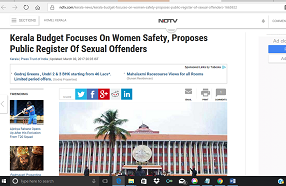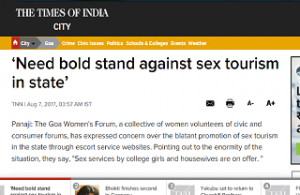M J Akbar defamation case: Verdict builds on Vishaka ruling, gives new legal shield to women

Date: February 10, 2021
Source: The Indian Express
Location: New Delhi, India
Prerana’s Take: “The woman has a right to put her grievance at any platform of her choice and even after decades,” Additional Chief Metropolitan Magistrate Ravindra Kumar Pandey noted in his verdict. As an organization working with victims of sexual violence for over 34 years, we understand how challenging it is for victims to speak up. We welcome this judgment and hope more victims are encouraged to speak up.
—
By ruling that “the right of reputation cannot be protected at the cost of the right of life and dignity of woman”, the Delhi trial court, which acquitted journalist Priya Ramani in a criminal defamation case filed by M J Akbar, has extended a legal shield to women speaking up against sexual harassment, even when it happened decades ago.
“The woman has a right to put her grievance at any platform of her choice and even after decades,” Additional Chief Metropolitan Magistrate Ravindra Kumar Pandey said in his 91-page verdict.
Although the trial was premised on Akbar and his right to reputation, it became a platform for recording allegations of sexual harassment against him. While the court did not examine the merits of the sexual harassment allegations, since it was not the subject of the trial, its decision is a shot in the arm for the women who testified against Akbar.
Corroborative statements by Ghazala Wahab, executive editor of Force magazine who testified against Akbar in court detailing her own account of sexual harassment by him; Niloufer Venkatraman, Ramani’s friend who testified that she had knowledge of the incident of sexual harassment in 1993 by Akbar, as alleged by Ramani; and the absence of a legal framework to protect women against sexual harassment at their workplace at that time formed the basis of the court’s reasoning to reject Akbar’s case.
Using the preponderance of probabilities as the standard of proof for Ramani’s defence, the court held that her testimony was more probable than Akbar’s claims. Preponderance of probability is a legal principle which is generally understood as the probability to lean towards one side being more than to lean to the other side.
The delay in speaking out or filing a formal complaint is often used against women to discredit their allegations. However, the court acknowledged that since there was no legal framework prior to the Supreme Court’s landmark verdict in 1997 in the Vishaka & Others vs State of Rajasthan case, the delay on Ramani’s part in speaking out against Akbar could not be motivated.
“The Court takes consideration of the systematic abuse at the workplace due to the lack of mechanism to redress the grievance of sexual harassment at the time of the incident of sexual harassment against the accused Priya Ramani and witness Ghazala Wahab prior to the issuance of the Vishaka Guidelines by Hon’ble Supreme Court of India and enactment of The Sexual Harassment of Women at Workplace (Prevention, Prohibition and Redressal) Act, 2013, or their option to not lodge the complaint of sexual harassment due to the social stigma attached with the sexual harassment of women,” the court said.
In 1997, in the Vishaka case, as it is widely known, the Supreme Court addressed a lacuna in law which offered no legal recourse for women who were sexually harassed at work. In 1992, Bhanwari Devi, a Dalit woman employed as a social worker by the Rajasthan government to spread awareness against child marriage, was gangraped. Her sexual assault, a result of the backlash against her work in the community, culminated in a plea before the SC seeking redressal for sexual harassment at workplace. The court created a set of guidelines, relying on international law principles and practices, to address this. The Vishaka guidelines, filled the vacuum in law till the Sexual Harassment of Women at Workplace (Prevention, Prohibition and Redressal) Act, 2013 was enacted.
Before 1997, sexual harassment was addressed under the Indian Penal Code (IPC) provisions that deal with outraging the modesty of a woman, either by criminal force (Section 354) or by word, gesture or act (Section 509). It was only in 2013 that IPC Section 354 was amended to include Section 354A that criminalises sexual harassment.
However, the court did not refer to the provisions under IPC that did not specifically deal with sexual harassment before 1997.
In their cross-examination by Akbar’s legal team, both Ramani and Wahab were asked if they were aware of a law dealing with sexual harassment prior to the Vishaka guidelines. The court noted that they replied in the negative.
Read The Indian Express (Source) article here.
“It’s Saturday evening at the National Human Trafficking Hotline, and we’ve had non-stop calls since mid-afternoon. I know there are Read more
“It’s Saturday evening at the National Human Trafficking Hotline, and we’ve had non-stop calls since mid-afternoon. I know there are Read more



